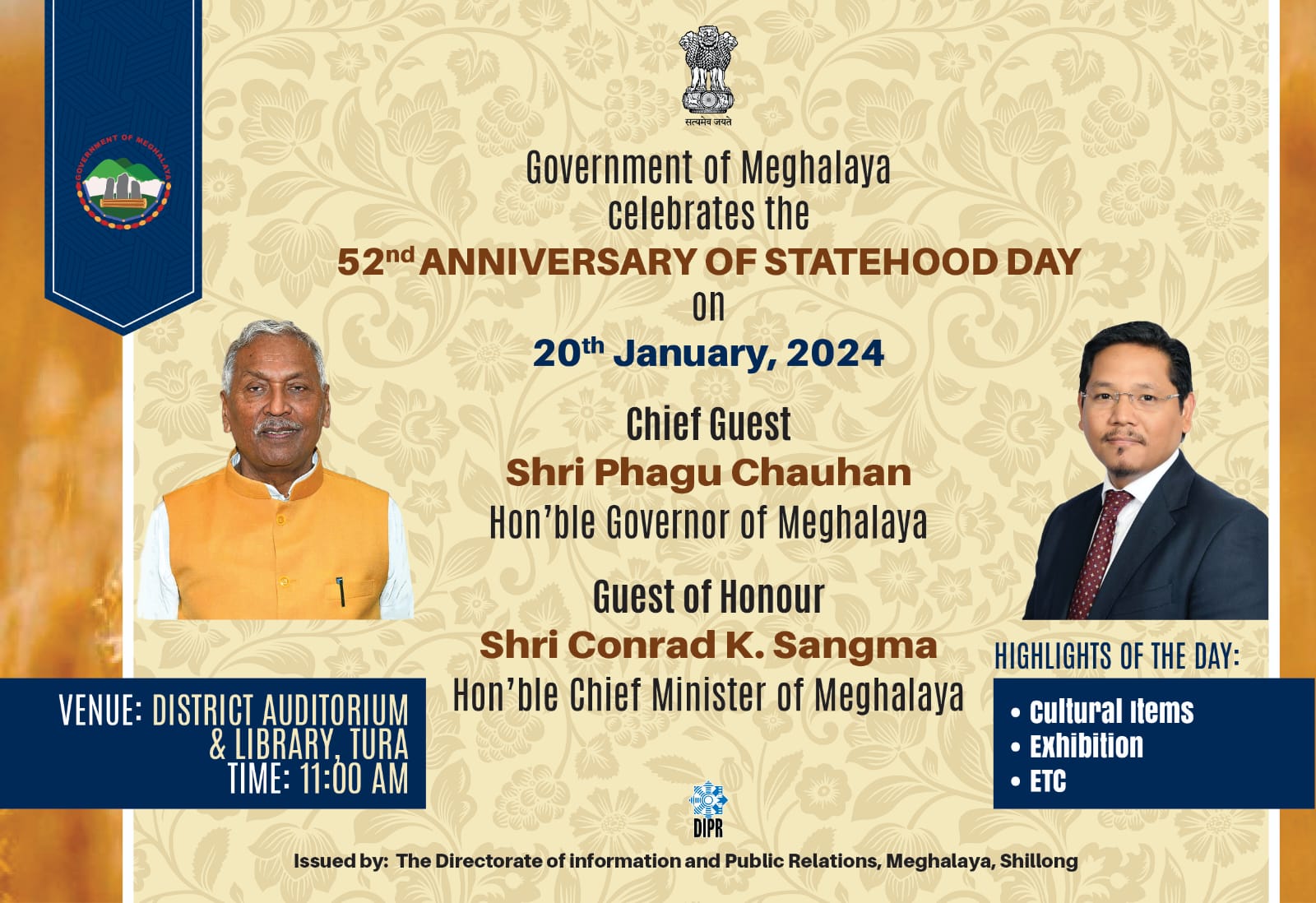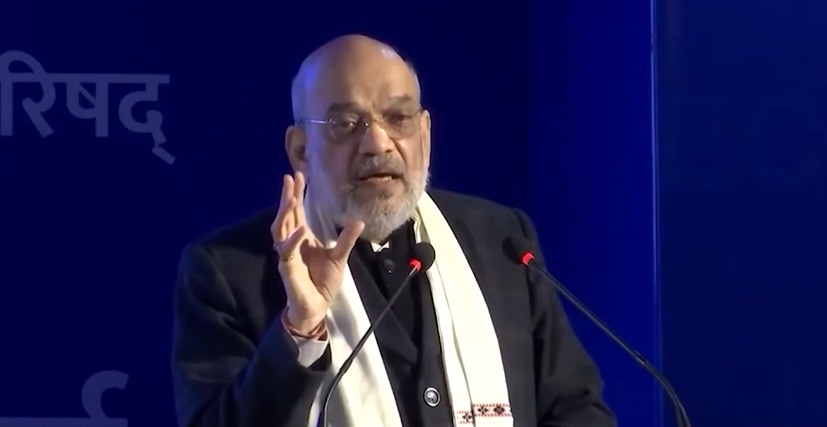Shillong, Jan 20: India is on the verge of implementing three new laws, which will replace the existing laws of Indian Penal Code (IPC), 1860; the Code of Criminal Procedure (CrPC), 1973 and the Indian Evidence Act, 1872. In an interview to a select group of journalists in Meghalaya, Union Home Minister Amit Shah sheds light on the new laws – Bharatiya Nyaya Sanhita (BNS), Bharatiya Nagarik Suraksha Sanhita (BNSS), and Bharatiya Sakshya Act (BSA) – that promise several significant changes and potential improvements to the Indian criminal justice system.
Here is an excerpt from the interview:
The three new criminal laws are touted as legislations that prioritise the security of women and children above many other issues. Could you please explain?
Ans. For the Modi government, the safety of women and children is of paramount importance. This is the reason the first chapter of the law is about the safety of women and children. This itself tells about our priority. There are 35 sections where we have made separate provisions on crime against women and children. Among these 35 13 new sections make the law even more stringent when it comes to the security and safety of women and children. For example, in gang rape 20 years of imprisonment and imprisonment till death. Gang rape of a minor will attract the death penalty or life imprisonment. A new provision on sex with false promises has also been added. We have filled up the vacuums in the law to protect women and children. We have adopted the guidelines given by the Supreme Court.
Also, earlier in cases of crimes against women, the statement of the victim was manually written and there was ample scope for influential accused to manipulate. But now recording of the same has been made mandatory and that too in the presence of the victim’s family. We have also made provisions for e-statement, and e-appearance. It will change the entire culture around justice and policing. A new provision has been on sex with false promises.
But what exactly necessitated the scrapping of the three laws?
Ans: Bharat as a nation deserves a legal system of its own. If you remember Honorable Prime Minister Shri Narendra Modi Ji from the ramparts of the Red Fort appealed to erase all the colonial imprints on our legal system. The IPC, CrPC and the Indian Evidence Act were not only imposed by the British but also were full of colonial terms and provisions which are not tenable to a democratic system. The priority of the laws promulgated by the Britishers was to protect their treasury. Therefore penal provisions related to looting of government treasury, looting of trains, and attacks on government officials received priority in numbering and were placed even before something as heinous as rape. Should not the safety and security of women be our priority after we have become an independent nation?
Those laws were made to ensure that no revolt raised its head and no chaotic situation emerged. That criminal justice system was shaped to punish. However, the new criminal justice system that the Modi government has promulgated is based on the foundation of justice.
I can say with conviction that after these laws have been notified our criminal justice system will be free from the mentality of servitude.

There have been allegations that detailed discussions with stakeholders were evaded before enacting these laws.
Ans: Seems you are taking the opposition at face value a bit too much. The consultation process to frame these laws began early in the year 2019 and ran through the next couple of years till they were passed. Thousands of suggestions were considered and also adopted during the process. Not many bills before them went through such an extensive and rigorous process of consultation.
After being sent to the standing committee of the Home Ministry for deliberation, these Bills have now been initiated by Prime Minister Modi, and are based on the principles of justice, equality, and fairness.
You also have been asserting that these laws would get our legal system rid of the ‘Tarikh Pe Tarikh’ syndrome. Could you please explain?
Ans: Let me give you an example. In the cases related to cheque bounce most of the times dates take place because of the absence of the bank official. But now the bank officials will be able to depose before the court without going to the court. Many dates were required to be given for the forensic experts to depose before the court. But now they can give their testimony from their laboratory itself. It took several days for the witness of a forensic pathologist to testify before the court. But now they can depose from their hospitals online. So the question of delay does not arise. Justice will be speedy and transparent.
We have made provisions for police, judiciary and prosecution to provide speedy justice in 35 provisions. For instance in cases of rape within 7 days the investigation report will have to be submitted. In all cases, the charges will have to be framed within seven days of the first hearing. We have provided for e-witnesses. Electronic transfer of records and summons will help reduce delay. Once these laws are rolled out any case filed will meet justice in just three years.
Absconding offenders have given the Indian agencies a hard time in prosecution. Does the provision related to proclaimed offenders deal with this issue?
Ans: A person charged with an offense with a sentence of 10 years or more can be proclaimed as an offender. We have also made provisions to confiscate their properties outside Bharat. For instance, if they acquired a property in Switzerland we did not have a provision in our laws to seize it. Now we have such a provision. Even for absconding criminals, we have made provision for trial in absentia. For example, Dawood Ibrahim is the prime accused in the Mumbai blast case but no trial could be initiated against him because he is an absconding criminal. Now such trials can be initiated against such criminals and the court will provide them with a defence lawyer and will punish them if required by law. This will change their legal status in the nation they are living in as they will become convicts in our nation and it will help us in bringing them back. The properties of convicts in the cases of economic offenses can now be seized after the passage of this law.

How are these laws victim-centric?
Ans: In the justice system built by the British, the cases involved the accused and the government. The victim was nowhere on the scene. We have given the right to the victim to engage a lawyer. Earlier if the government had to withdraw a case the victim was not needed to be consulted. But we have decided that no one can withdraw an offence without the consent of the victim. Earlier police used to come and conduct search and seizure operations. But we have made videography of the operation compulsory and that too in the presence of two neutral witnesses and mandatorily. Earlier no one used to take responsibility for a complaint. No one knew what would be its outcome. But we have decided that within 90 days of the complaint, the police will have to inform the victim. There were many cases in the country where the police used to detain for weeks but the family members did not get any answer. But we have decided that every police station will designate an officer who will keep account of the people detained and also will disburse information about them. Once the detention is registered the police will have to take the detainee in remand officially from the court. Earlier cheating was punished but there was no provision to compensate the people who were cheated. But now we have decided that the aggrieved people will have to be compensated by the convicted cheat from his assets. This way we have given justice importance in many aspects of the laws. Earlier in cases of crimes against women, the statements of the victim were manually written and ample scope for manipulation was there. But now recording of the same has been made mandatory and that too in the presence of the victim’s family. We have also made provisions for e-statement, and e-appearance. It will change the entire culture around justice and policing.
These will benefit victims. Moreover, earlier there was no system to inform the victim about the complaint. But now the victim will have to be informed within 90 days about the outcome of the complaint. The victim will have to be kept in the loop. No case can be withdrawn without the consent of the victim. Earlier the victim’s lawyer did not have the right to argue. But now they will have it. Earlier the protection of the witness was under the discretion of the court. But now it is the responsibility of the state government to protect the witnesses. The state government will notify the Witness Protection Scheme and the police station will implement it. For under trials, we have also made the provision of compulsory bail. I believe that whether it is about promoting technology, speeding up trials or fixing the responsibility of the police, we have tried to protect the rights of the victims.

These bills are said to have a separate take on terrorism. Could you please explain?
Ans: For the first time ever terrorism has been defined in such detail in a law. Without the definition of terrorism, it was impossible to tackle it. Many times terrorists were acquitted because there was no definition of terrorism. The police did not have any concrete answer to it. Under our policy of zero tolerance for terrorism, we have defined terrorism. Anyone who messes around with Bharat’s unity, integrity and sovereignty will face the death penalty or lifelong imprisonment.
The new criminal laws do not include the provision related to sedition but a new provision on treason has been included. How both are different?
Ans: There is a vast difference between Sedition or Rajdroh and Treason or Deshdroh. Earlier speaking against the government was a crime. Under this law Lok Manya Tilak. Veer Savarkar, and Mahatma Gandhi, were tried and sent to jail. We have removed the very word Raj from here. Instead, we have named it Deshdroh. Article 1 of the Constitution defines what Desh means. Desh does not mean an elected government as per this Article. Rather it means Bharat. Anyone who acts against the sovereignty and integrity of Bharat will get a sentence of 7 years. To ensure that it is not misused a clear-cut provision has been made. We have left no space for its misuse.
The new criminal laws also provide for community service?
Ans: The petty crimes have been freed from penalties and imprisonment. For instance, if someone commits a crime accidentally then we are giving him a chance to improve himself through community service
Could you explain the provisions made to prevent organized crimes?
Ans: First of all there was no definition of organized crimes to date. We have done it for the first time. When we talk about organized crime the pseudo-seculars only understand a certain kind of crime. But involving children in beggary is also organized crime. Interstate arms trade, smuggling, narcotics trade, terrorism, trafficking of women, fake currency, fake stamp paper and inter-state gangs are also organized crimes. But there were no separate provisions for organized crimes. If an AK 47 was found in a person’s custody then he is tried under the same provision under which a person with a handmade pistol is tried. But now they will be tried differently and the person with an AK 47 will be tried under the provision of organized crime because it must have been procured from a foreign country. It will strengthen the law enforcement agencies. We have gone through an extensive consultation process. We received thousands of suggestions and accepted most of them. We have also accepted most of the suggestions of the parliamentary standing committee.
The new laws are touted as tech-savvy ones. Could you please explain how technology will have a bearing on policing?
Ans: These laws are meant to change the entire system itself. They incorporate all the technologies available today into the criminal justice system. These laws also make provisions to include the possible innovations in technology that may emerge in the next 50 years because we have included them in the definition. For instance, earlier charge sheets were to be filed in hard copies but now you can do it with a pen drive. Earlier witnesses had to appear in the court for the deposition but now it can be done online. Earlier summons had to be served at home. It would take months for a summon to be served. But now summons can be served through WhatsApp and once the message is opened the server will deem the summon as served. Similarly, provisions have been made for E-FIRs and zero FIRs. Along with that for cases with sentences of seven years or more visits of forensic experts have been made compulsory. This will provide the prosecution with concrete scientific evidence which will help us in increasing the conviction percentage. We have made videography of statements compulsory. Earlier in cases of crimes against women, the statements of the victim were manually written and ample scope for manipulation was there. But now recording of the same has been made mandatory and that too in the presence of the victim’s family. We have also made provisions for e-statement, and e-appearance. The new laws will change the entire culture around justice and policing.
It has been said that the BJP will touch the 400 mark in the 2024 election
Ans: It is still very premature to give any number. If anyone does it then it is done only to satisfy you. I will give you my analysis of the political atmosphere that says that the BJP and its allies will get more seats than in the previous election and Modi Ji will become the prime minister for the third term.
Also Read : M’laya Govt appeals to HNLC to resume peace talks, willing to meet them at ‘preferred location’
Also Watch






